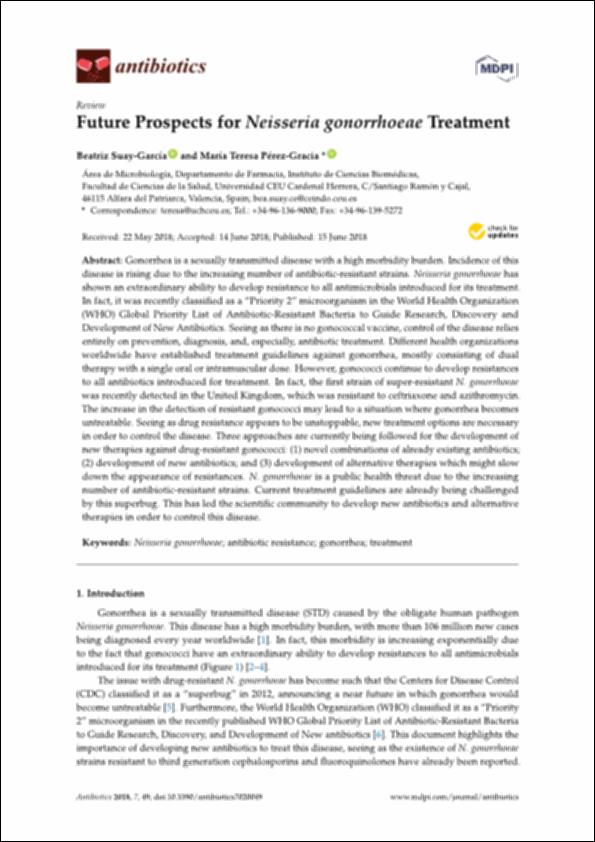Por favor, use este identificador para citar o enlazar este ítem:
http://hdl.handle.net/10637/9942Future prospects for "Neisseria gonorrhoeae" treatment
| Título : | Future prospects for "Neisseria gonorrhoeae" treatment |
| Autor : | Suay García, Beatriz Pérez Gracia, María Teresa. |
| Materias: | Blenorragia - Tratamiento.; Blennorrhagia - Treatment.; Blenorragia - Farmacoterapia.; Neisseria gonorrhoeae.; Resistencia a los medicamentos.; Drug resistance in microorganisms.; Blennorrhagia - Chemotherapy. |
| Editorial : | MDPI |
| Citación : | Suay García, B. and Pérez Gracia, MT. (2018). Future prospects for "Neisseria gonorrhoeae" treatment. Antibiotics, vol. 7, n. 2 (junio 2018), art. 49. |
| Resumen : | Gonorrhea is a sexually transmitted disease with a high morbidity burden. Incidence of this disease is rising due to the increasing number of antibiotic-resistant strains. Neisseria gonorrhoeae has shown an extraordinary ability to develop resistance to all antimicrobials introduced for its treatment. In fact, it was recently classified as a “Priority 2” microorganism in theWorld Health Organization (WHO) Global Priority List of Antibiotic-Resistant Bacteria to Guide Research, Discovery and Development of New Antibiotics. Seeing as there is no gonococcal vaccine, control of the disease relies entirely on prevention, diagnosis, and, especially, antibiotic treatment. Different health organizations worldwide have established treatment guidelines against gonorrhea, mostly consisting of dual therapy with a single oral or intramuscular dose. However, gonococci continue to develop resistances to all antibiotics introduced for treatment. In fact, the first strain of super-resistant N. gonorrhoeae was recently detected in the United Kingdom, which was resistant to ceftriaxone and azithromycin. The increase in the detection of resistant gonococci may lead to a situation where gonorrhea becomes untreatable. Seeing as drug resistance appears to be unstoppable, new treatment options are necessary in order to control the disease. Three approaches are currently being followed for the development of new therapies against drug-resistant gonococci: (1) novel combinations of already existing antibiotics; (2) development of new antibiotics; and (3) development of alternative therapies which might slow down the appearance of resistances. N. gonorrhoeae is a public health threat due to the increasing number of antibiotic-resistant strains. Current treatment guidelines are already being challenged by this superbug. This has led the scientific community to develop new antibiotics and alternative therapies in order to control this disease. |
| Descripción : | Este artículo se ha publicado de forma definitiva en https://www.mdpi.com/2079-6382/7/2/49 |
| URI : | http://hdl.handle.net/10637/9942 |
| Derechos: | http://creativecommons.org/licenses/by/4.0/deed.es |
| ISSN : | 2079-6382. |
| Fecha de publicación : | 1-jun-2018 |
| Centro : | Universidad Cardenal Herrera-CEU |
| Aparece en las colecciones: | Dpto. Farmacia |
Los ítems de DSpace están protegidos por copyright, con todos los derechos reservados, a menos que se indique lo contrario.


